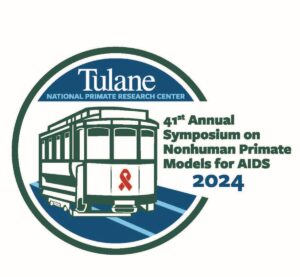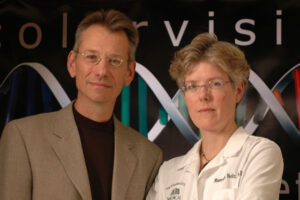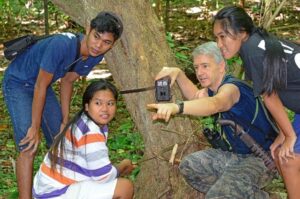Chlamydia is one of the most widespread infectious diseases in the world, and it is remarkably difficult to prevent its spread. However, Dr. Kevin Hybiske, microbiologist and professor at the University of Washington in infectious diseases, microbiology and global health, offers new hope in collaboration with the Washington National Primate Research Center.
In his lab, Dr. Hybiske is unraveling the complex ways this pathogen manipulates human cells to spread and evade the immune system. By understanding these mechanisms, his team aims to develop innovative therapies that could one day lead to better treatments and, ultimately, a reduction in the global health burden caused by this disease.
“Anecdotally, it’s probably one of the oldest bacterial pathogens of multicellular hosts,” Dr Hybiske said. “We study it because we still don’t understand the processes it uses to infect cells (and thus people), and we need to better understand that to so we can improve our ability to treat it.”
According to the World Health Organization, there were more than 128 million new cases of this sexually transmitted infection (STI) in 2020. And before COVID, it was the most reported infection in the United States.
While Chlamydia can be easily treated with antibiotics, there is no preventative vaccine, and people infected with it often have no symptoms. These factors contribute to the high prevalence of Chlamydia in the population, disproportionally affecting women and people with limited access to medical screenings or treatment. If left undiagnosed and untreated, chlamydia can cause serious problems, including pelvic inflammatory disease and an increased risk of infertility and ectopic pregnancy.
Dr Hybiske’s lab is interested in studying the key steps involved with the development of the disease, in part, by creating “mutants” of chlamydia to learn how one mutant does its job of entering and exiting cells so that it can propagate.
“A big part of my lab is in the business of making Chlamydia mutants,” he said. “We’re among the best in the world at that. We use this strategy to figure out what’s important” in the ways chlamydia infects and impacts humans.
“Microbiologists make mutants and figure out what processes they can no longer do and trace the facts to a gene that’s been disrupted. And that’s how you figure out how a pathogen does what it needs to do. Whether divide, or attach, or kill a host cell,” he said. “Until about 10 years ago people who studied chlamydia couldn’t do that.”
A major hurdle to studying this pathogen is that, unlike some other bacteria, chlamydia requires a mammalian host and cannot be grown in a dish. Which is where WaNPRC comes in.
“I have had long professional relationships with investigators at UW who had established the chlamydia infection model in macaques. They’re the best in the world at it,” he said.
“This research is the kind of thing that can only be done in the circumstances that exist at WaNPRC because of the combination of collaborators, and the teams who care for the monkeys,” he said. “This is the basic science we’ve only recently been able to do, and we’re among the best. We have small libraries of mutants that no one else has, and which we are eagerly hoping to test in relevant models. Our partnership with the WaNPRC allow us to experiment and test in ways that’s never been done.”
Hybiske and his team are keenly aware of the ethical considerations surrounding primate research and take steps to ensure that their work is responsible and beneficial. In a recent pilot study, Hybiske explored the vaccine potential of a new genetically attenuated mutant of Chlamydia and found that exposing monkeys to this vaccine strain was safe and led to immunity against challenge with a pathogenic Chlamydia strain. This type of responsible research is respectful of animal well-being and health and also has the potential to lead to promising advances for addressing human Chlamydia infections. He hopes to receive a grant to pursue this vaccine development further.
The World Health Organization is working to reduce the global burden of sexually transmitted infections like chlamydia, aiming for a 50% reduction in new cases of chlamydia by 2030. “My work slides into that,” Hybiske said. “I am not someone who normally thinks about vaccine design, my work has mostly been focused on figuring out Chlamydia’s deep molecular secrets.” And the secret could be connected to creating a mutant of chlamydia with special properties that could be beneficial in a vaccine.
“There’s a well-trod path to vaccine development, and we are at the beginning,” he said. “We’re doing the necessary next steps to see what happens. See where that takes it. Even if this strain doesn’t become a vaccine home run, we are poised to learn a great deal about the primate’s immune response to a Chlamydia vaccine, and this will certainly aid other people who are trying to make vaccines. If we are lucky, one of these vaccine candidates will work great and have an impact on public health.”
 Congratulations to Dr Megan O’Connor on her appointment as Assistant Professor to the Department of Laboratory Medicine and Pathology at the University of Washington!
Congratulations to Dr Megan O’Connor on her appointment as Assistant Professor to the Department of Laboratory Medicine and Pathology at the University of Washington!
 In
In  And it’s led to the development of products that produce these alternating blue/orange wavelengths. Called “
And it’s led to the development of products that produce these alternating blue/orange wavelengths. Called “
 Increasing investment and support for neuroscience research involving monkeys is critical to realize our hope for advancing human health and reducing suffering for millions of people confronting diseases like Alzheimer’s, bipolar dis- order, depression, anxiety, schizophrenia. So argues Dr. Michele A. Basso, core scientist in the Neuroscience unit of the Washington National Primate Center.
Increasing investment and support for neuroscience research involving monkeys is critical to realize our hope for advancing human health and reducing suffering for millions of people confronting diseases like Alzheimer’s, bipolar dis- order, depression, anxiety, schizophrenia. So argues Dr. Michele A. Basso, core scientist in the Neuroscience unit of the Washington National Primate Center.


